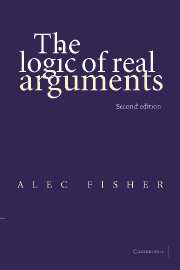Book contents
- Frontmatter
- Contents
- Preface to the first edition
- Preface to the second edition
- Acknowledgements
- 1 Introduction
- 2 A general method of argument analysis
- 3 A first example – from Thomas Malthus
- 4 Reasoning about nuclear deterrence
- 5 An example from John Stuart Mill
- 6 Arguments about God's existence
- 7 How do your mind and body interact?
- 8 Suppose for the sake of argument that …
- 9 An example from Karl Marx
- 10 Evaluating ‘scientific’ arguments. Some initial examples
- 11 Philosophical assumptions
- Appendix: Elementary formal logic
- Exercises
- Bibliography
- List of further reading
- Index
Preface to the second edition
Published online by Cambridge University Press: 05 June 2012
- Frontmatter
- Contents
- Preface to the first edition
- Preface to the second edition
- Acknowledgements
- 1 Introduction
- 2 A general method of argument analysis
- 3 A first example – from Thomas Malthus
- 4 Reasoning about nuclear deterrence
- 5 An example from John Stuart Mill
- 6 Arguments about God's existence
- 7 How do your mind and body interact?
- 8 Suppose for the sake of argument that …
- 9 An example from Karl Marx
- 10 Evaluating ‘scientific’ arguments. Some initial examples
- 11 Philosophical assumptions
- Appendix: Elementary formal logic
- Exercises
- Bibliography
- List of further reading
- Index
Summary
This second edition differs from the first mainly by the addition of two new chapters. These deal with some fascinating arguments about the existence of God and about how our minds and bodies interact. Although this approach to teaching students how to analyse and evaluate arguments was first published in 1988, many students and teachers still find it useful and instructive, and this seems to be especially true in Philosophy departments, hence the choice of new topics. The general approach has not been changed here, but the new examples illustrate applications of my approach in particular contexts – some especially philosophical and one which is rhetorically powerful. It has been a pleasure to write this second edition and I particularly want to thank Nicholas Everitt for reading the new chapters and making very helpful suggestions; I often accepted these but, needless to say, the resulting work is my responsibility. Again I also wish to thank Cambridge University Press for their help and patience and my wife and family for theirs too.
Information
- Type
- Chapter
- Information
- The Logic of Real Arguments , pp. xPublisher: Cambridge University PressPrint publication year: 2004
